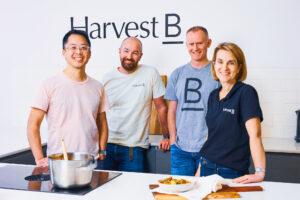Australian food innovators protein to boost nutrition
Australian food manufacturer Harvest B will launch two, world-first, blended diced meat products. The great tasting product has been developed to improve the affordability and nutritional value of animal meats, while boosting sustainability and availability of protein to a greater range of customers.
In a world-first, the sustainable protein manufacturer will collaborate with the animal protein industry to offer a novel, Australian-made diced meat featuring a 50:50 ratio of animal- to plant-protein. The slow cooked product, which will come pre-prepared for ease of use in the food service industry, addresses the health, inflationary, climate and geopolitical issues impacting food supply – all while retaining the taste and texture of the meats consumers know and love.
The diced beef and diced lamb products will deliver 30 per cent more protein yield per serve, boost fibre, retain iron and B12 content and halve the cholesterol, total and saturated fat content, all while reducing paddock to plate emissions by up to 46 per cent when compared to traditional 100% meat products.
CEO and Co-founder of Harvest B, Kristi Riordan said, “The global food industry is being influenced by a number of macro issues and at this nexus of taste, nutrition, cost and sustainability is precisely where Harvest VB has sought to provide a solution.”
“Our diced meat blends do not sacrifice taste or texture. You still have the same great tasting meat product but with half the saturated fat and cholesterol, more fibre, iron and vitamin B-12 but at a cost per serve value that is 30 per cent better than current protein products – this is a win-win for consumers and the food service industry,
“Historically, animal protein has been blended with other ingredients to achieve cost reductions in products like sausages, burgers and meatballs. We wanted to leap forward into the next generation of products with something that addresses affordability in our current inflationary environment, but also improves nutrition in a higher quality protein product.” Said Riordan
Harvest B’s technology sustainably produces large pieces of plant proteins, similar in texture to meat, without the need for artificial binders and additives that plant-based meats have traditionally needed. Paired with animal proteins in its blended range, the slow cooked diced meats absorb ‘purge’ (fluid) that would normally be left behind in packaging or the pan, meaning less waste, less packaging and less transport costs. This novel approach has allowed food producers to rethink the way they approach the development of new products and bridge the gap between pure meat and vegetarian products.
“Harvest B believes the path to a more sustainable food industry needs all consumers to be active participants of the journey. For too long, the food industry and consumers have been offered expensive products that have not met their expectations for taste, texture and usability. By narrowly focussing on meat-free consumers we have left such a huge consumer base on the sidelines – this needs to change.” said Harvest B CEO and Co-founder.” said Alfred Lo, Harvest B COO and Co-founder.
“The current way of feeding the world’s population is unsustainable and frankly becoming more expensive, and volatile. Harvest B blended products are a way to better manage our finite resources, making them more affordable, healthier to consume and easier to use – be it in a good bolognese, bourguignon or burrito.” said Lo.
Since commencing operations in Sydney Australia in late 2022 with the support from the Australian Federal Government and institutional investors, Harvest B has experienced sustained growth for its products locally and abroad.
The company recently finalised a distribution and export agreement into New Zealand, achieved CE and Halal certification for its products and entered into supply agreements with major food manufacturers and service providers in Australia. The company has just secured further funding from a range of institutions as the company prepares for international growth in line with growing demand for sustainable food products.



